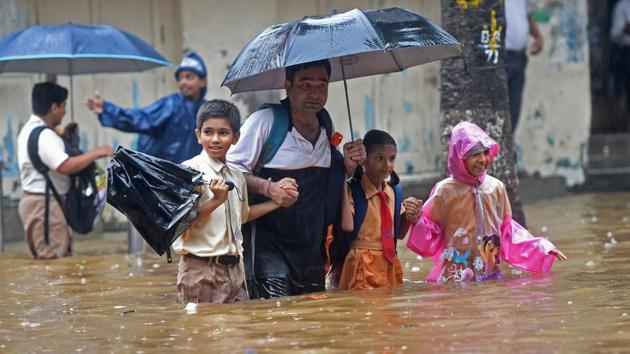New weather phenomenon: Beware of the mini-cloud bursts, says study
Indian scientists have coined a new term to define incidents of heavy rain over short periods of time, a phenomena that is common during the monsoon in Mumbai, and which they say are expected rise in the future
Indian scientists have coined a new term to define incidents of heavy rain over short periods of time, a phenomena that is common during the monsoon in Mumbai, and which they say are expected rise in the future.

Called mini-cloud burst (MCB), the term was first used in 1999 by scientists CS Ramage and Thomas A Schroeder to study high rainfall at Mount Waialeale, in Hawaii’s Kauai — one of the world’s wettest spots. However, during this study, the two scientists did not quantify the amount of rainfall.
While rainfall exceeding 100mm in an hour — a phenomena largely associated with cloud conditions in the Himalayan region and which leads to flash floods — has already been categorised as cloud burst events, according to the India Meteorological Department (IMD), so far there have been no categories to define intense, but short bursts of rain.
Now, based on the concept of the 1999 study, a four-member team from Pune’s Indian Institute of Tropical Meteorology (IITM), which is under the
Ministry of Earth Sciences, and Texas A&M University-Corpus Christi has defined MCB as short-term but intense rainfall events characterised by 50mm rain or more in two consecutive hours.
The IITM team also redefined cloud bursts as CBa (associated with high topography), CBb (more than 100mm in an hour), and MCB (more than 50mm in two consecutive hours).
At present, rainfall of 50mm and above in two consecutive hours does not fall under the category of a cloud burst (CBb) even though the floods and damage it causes is similar.
The team’s findings assume significance because MCB events cause urban flooding in a city like Mumbai, and lead to loss of life and damage to property. The scientists also described the incessant downpour of September 20, 2017 — 304mm in just a day over Mumbai that grounded country’s financial capital — as a combination of MCB and CBb events.
The researchers said the rate of accumulation of water during a mini-cloud burst is three times more than in an extreme rainfall event — which the IMD calculates as 200mm in 24 hours — with three times more probability of flash floods.
Independent experts said the prediction of MCBs can also be used to find solutions to flooding during flash floods.
“The work by the IITM scientists provides important insights on cloud burst and mini-cloud burst events that can cause flash flooding in the mountains and cities,” said Vimal Mishra, an associate professor, civil engineering, in the Indian Institute of Technology- Gandhinagar, who was not involved in the study. “The next step can be to find what the major driving factors of such events are, that cause loss of lives and infrastructure. In the future, the predictability of these events of such a short duration (1-2 hours) can be evaluated. This is essential to reduce damage.”
“Along the west coast, MCB events occur when there is a combination of a strong offshore trough (elongated region of relatively low atmospheric pressure that affects weather) from south Gujarat to the Kerala coast, along with other weather systems from the Arabian Sea and Bay of Bengal,” said Nayana Deshpande, principal investigator, IITM. “Anthropogenic changes increase the severity of such rainfall events. As the existence of such events remains unclear in the meteorological community, we coined the term mini-cloud burst.”
An analysis of hourly rainfall data between 1969 and 2015 across 126 rain gauges has revealed that on an average, India records 200 MCB events a year, with the highest (around 265 MCBs) in 1988 and 2007. India has recorded 28 CBb events during the study period. Trend analysis also indicated that MCB events are likely to increase in the future with cities such as Mumbai witnessing an average of five or more MCB events every monsoon, Kolkata recording between three and five MCB events, and Delhi likely to record an average of one to two MCB events.
The study also found that MCB occurs over the Western Ghats in June; over central India and the foot hills of the Himalayas in July and August. The frequency is low in the month of September. These short duration heavy spells, researchers said, generally take place during the morning hours (midnight to noon) at the foot hills of the Himalayas, and along the west coast of India — which includes Mumbai. MCBs in central India occur in the afternoon (noon to 6pm), and in south India, at night (6pm to midnight).
Statistical analysis also showed that the intensity of MCB events in the Himalayan foothills, west coast, and Western Ghats increased after 1991, but has decreased in the northeast. Deshpande said IITM researchers will share their findings with the India Meteorological Department, which is the official weather forecaster for the country.
The study ‘Statistical characteristics of cloud burst and mini-cloud burst events during monsoon season in India’ was published in the International Journal of Climatology, a peer-reviewed journal of the Royal Meteorological Society, this month.
Stay updated with all the Breaking News and Latest News from Mumbai. Click here for comprehensive coverage of top Cities including Bengaluru, Delhi, Hyderabad, and more across India along with Stay informed on the latest happenings in World News.
Stay updated with all the Breaking News and Latest News from Mumbai. Click here for comprehensive coverage of top Cities including Bengaluru, Delhi, Hyderabad, and more across India along with Stay informed on the latest happenings in World News.





